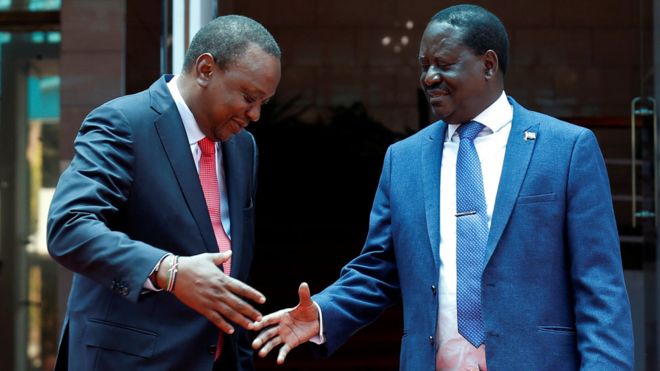Economic Impact of Uhuru Kenyatta and Raila Odinga Handshake in Kenya

Kenyans went into a hotly contested election in August 2017. The Independent Electoral and Boundaries Commission declared the incumbent, President Uhuru Kenyatta, as the winner of the elections. Raila Odinga, the charismatic leader of the opposition party, came second. Odinga claimed foul play in the elections and refused to accept the results.
Political Tensions in Kenya
What followed was a series of protests in the opposition’s strongholds, with Raila Odinga remaining adamant that he won the elections. As a result, the country’s political temperature was high, subsequently leading to a significant negative impact on the country’s overall economy. The situation was exacerbated when Odinga swore himself in as the president–a move considered by some pundits as equivalent to treason.

The swearing in of Raila Odinga as ‘The People’s President’, few months after the official swearing in of Uhuru Kenya as the President, threw the country into limbo. With Odinga enjoying support from a significant proportion of the population, the divisions across party and ethnic lines were self-destructing.
Falling Economy
Most businesses considered certain parts of the country as high-risk areas to commit their investments. Some foreign investors took leave waiting for the outcome of the unfolding events. The country’s economy was on a downhill stretch. With the country’s history of the 2007-2008 post-election violence, the investors took no chances.
The Truce
On March 9, 2018, a new dawn in the country’s future was birthed on the steps of Harambee House in the Nation’s capital, Nairobi. Raila Odinga and Uhuru Kenyatta shook hands as a sign of reconciliation after hours of talks at the President’s office. Ultimately, the leaders exhibited a show of unity by shaking their hands and addressing the nation together.

Kenya being an important East and Central Africa’s economic hub, this was good news for both Kenyans and non-Kenyans in the region. In addition, the handshake was a good sign for foreign investors from Europe, Asia, and the Americas.
Rebounding Economy
Since March 2018, Kenya has enjoyed tranquility and stability, creating a favourable environment for investors and local businesses. Once again, the prospects of the country’s growing economy are high. As of April 2018, just a month after the truce, the Kenyan shilling hit a two-year high. With foreign investors’ confidence restored, there was a rise in inflows.
The country’s economy advanced by 6 percent year-on-year in the third quarter of 2018. According to the World Bank, Kenya’s economy is projected to grow by 5.8 percent in 2019. Furthermore, the IMF has ranked Kenya as among the fastest-growing economies in 2019, with a projected growth rate of 3.8 percent. The upward trajectory in the country’s economy is a result of the ‘handshake’ between Uhuru Kenyatta and Raila Odinga.
The handshake is a good example to other African leaders on how to unite a country.





Responses